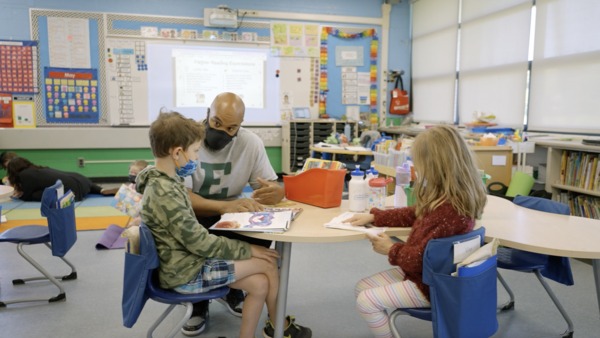Washtenaw Public Schools Growing Their Own Educators

Washtenaw County, Mich. – As schools settle into the 2022-23 year, districts are also looking toward the future and engaging in innovative programs that will ensure schools have the high-quality educators that students deserve. Washtenaw Intermediate School District (WISD) and public schools across Washtenaw County are working collaboratively to invest in staff who want to become teachers.
“We have incredibly dedicated staff working in our schools,” said Dr. Jennifer Banks, Director of Instruction at Washtenaw ISD. “Schools should be investing in exceptional people who have the drive and passion to teach, and we should make it known that we will invest in you if you want to be an educator.”
In order to combat school staffing shortages, the Michigan Department of Education (MDE) has encouraged communities to look for innovative ways to “grow their own” educators. Washtenaw ISD is leveraging its close relationships with local public school districts and Eastern Michigan University to offer multiple opportunities of support to existing public school employees.
Washtenaw ISD recently received a $110,000 Future Proud Michigan Educator Grow Your Own Grant from MDE, which will reimburse staff who are currently enrolled in college courses and working towards their teacher certification. The district was one of 80 grantees across the state, and 11 of WISD’s own staff are receiving up to $10,000 each to cover the costs of teacher preparation coursework, program fees, and testing fees. As part of the grant, WISD will continue to retain and support the employees receiving grant funding while they advance through their courses. MDE is expected to begin a second phase of Grow Your Own grants during this fiscal year.
The Paraprofessional-to-Teacher Certification Pilot Program is the second initiative led by WISD in partnership with local school districts and Eastern Michigan University. Paraprofessionals, also known as Paraeducators, Teaching Assistants, Classroom Aides, or “Parapros” for short, work directly in classrooms under a classroom teacher to support small groups or 1-on-1 students. The pilot program, made possible by a special waiver granted by MDE, covers most of the costs of teacher preparation courses at Eastern Michigan University, including books and fees, for dedicated parapros already working in area schools. Upon completion of the program, parapros will be certified special education teachers specifically for students with emotional impairments or learning disabilities.
“Collectively, public schools are the second largest employer in our county and 10% of school staff are paraprofessionals already working in our classrooms,” noted WISD Superintendent Naomi Norman, citing regional employer data from both SPARK and MI School Data. “Our parapros are living and working in our communities. They are already invested in our students and in our schools, and we want to make sure there is a pathway for them to advance professionally.”
Paraprofessionals are often the heart of their classrooms, even though they are some of the lowest-paid school staff. Their backgrounds, experiences, and identities are also more reflective of the diverse student populations in classrooms today. Many have dreams of leading their own classrooms as certified teachers, but the financial burdens of newly starting or returning to college can be prohibitive.
“I want to be a teacher to make a difference in children’s lives,” shared Justin Harper in this video developed by Washtenaw ISD. “I don’t just need to focus on the academics. If I can be there to mentor you, to guide you in any aspect of your life, I want to be there for that.” Harper has been a paraprofessional at Dicken Elementary in Ann Arbor Public Schools for six years, and he takes evening classes with EMU as a pilot program student after he finishes a full day of work at Dicken.
The Paraprofessional-to-Teacher Certification Pilot Program aims to minimize the barriers and increase success by providing evening classes centrally located in the county and a dedicated program mentor. It will take each parapro three to three and a half years to complete the program. Nearly 60 students are enrolled in the first three cohorts, with a fourth cohort expected to start in Winter 2023.
Harper expresses, “I’m just so grateful of the collaboration with the local districts, WISD, and Eastern Michigan working together to invest in us to get the best education that we can have to be the most incredible teachers we can be.”
